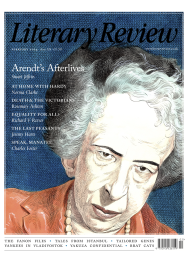Jason Goodwin
Sultans Old & New
To the City: Life and Death Along the Ancient Walls of Istanbul
By Alexander Christie-Miller
William Collins 416pp £25
The sometimes-fraught question ‘Where are you really from?’ raises no eyebrows in Istanbul. As Alexander Christie-Miller points out, almost everyone there is from somewhere else, and long has been. The Roman emperor who founded Constantinople in AD 330 was born in Serbia and proclaimed emperor in York. The Turks who seized the city more than a millennium later absorbed waves of incomers from the Balkans, the Eurasian Steppe and the mountain villages of Anatolia. Many of those born in a city whose population has swollen from three to fifteen million in the last forty years have roots elsewhere. Recep Tayyip Erdoğan – a successful footballer and Istanbul mayor before his apotheosis as president – comes from a family which migrated to Istanbul in the 1930s from the Black Sea region; we learn that his father was a Bosphorus boat captain.
The book’s title, To the City, is a translation of the medieval Greek phrase stin polin, which supposedly gave rise to the Turkish name Istanbul. ‘To the city’, in a way, does sum it up: foreigners would extol the beauty of the city as they made their approach and recoil, once ashore, from its cramped and dirty streets. It is a city, as one Renaissance ambassador declared, destined to be the navel of the world, a strategic bottleneck where, as Alexander William Kinglake said, ‘it is a 120-gun ship that meets you in the street’. A chronicler of 20th-century Istanbul, John Freely, was always drawn to the weird and unexpected characters in its streets, the eccentrics, the down-and-outs, the elderly White Russians living on thin air, sad-eyed Armenians, the last of the Greeks, street vendors and gentlemanly scholars and grave small shopkeepers, all of whom seemed to find a perch in the city, like the pigeons nesting in its crumbling walls. Orhan Pamuk, reviewing the city of his youth, found it steeped in hüzün, a form of melancholy, while Jan Morris, at the height of the Cold War, found it gruff and ominous. Yok is the Turkish for ‘no’. She called it the City of Yok.
But cities change. The last two decades have seen rampant development on the streets of Istanbul, and revolutions in Turkish society and politics, meaning the time is ripe for a new examination of the world’s navel. Christie-Miller is perfectly equipped for the task, and his book is an absorbing and

Sign Up to our newsletter
Receive free articles, highlights from the archive, news, details of prizes, and much more.@Lit_Review
Follow Literary Review on Twitter
Twitter Feed
Under its longest-serving editor, Graydon Carter, Vanity Fair was that rare thing – a New York society magazine that published serious journalism.
@PeterPeteryork looks at what Carter got right.
Peter York - Deluxe Editions
Peter York: Deluxe Editions - When the Going Was Good: An Editor’s Adventures During the Last Golden Age of Magazines by Graydon Carter
literaryreview.co.uk
Henry James returned to America in 1904 with three objectives: to see his brother William, to deliver a series of lectures on Balzac, and to gather material for a pair of books about modern America.
Peter Rose follows James out west.
Peter Rose - The Restless Analyst
Peter Rose: The Restless Analyst - Henry James Comes Home: Rediscovering America in the Gilded Age by Peter Brooks...
literaryreview.co.uk
Vladimir Putin served his apprenticeship in the KGB toward the end of the Cold War, a period during which Western societies were infiltrated by so-called 'illegals'.
Piers Brendon examines how the culture of Soviet spycraft shaped his thinking.
Piers Brendon - Tinker, Tailor, Sleeper, Troll
Piers Brendon: Tinker, Tailor, Sleeper, Troll - The Illegals: Russia’s Most Audacious Spies and the Plot to Infiltrate the West by Shaun Walker
literaryreview.co.uk